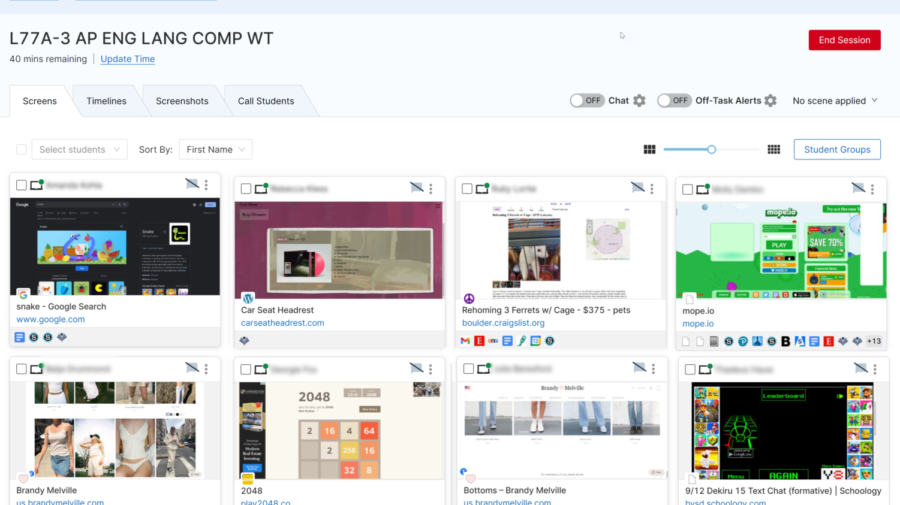Go, Go, GO Guardian
Teachers can view your screens and open tabs even after class hours.
There are two things every BVSD student should know. One is that the school nachos are absolutely delightful. The other is that the district has installed what might be described as spyware onto all student’s school accounts- spyware that lets teachers see and change, in real-time, what students are doing online.
GoGuardian is a program that BVSD introduced to the district primarily during the pandemic while students began virtual learning. It’s described as an application that aids teachers in keeping students on task, engaged and safe as they learn. Two years later, the effects of this digital surveillance system are being illustrated by schools all over the nation, redefining the application as “spyware.”
GoGuardian, like many other digital businesses, decides not to disclose the intricate details of how its algorithms arrive at their judgments. According to CEO Advait Shinde GoGuardian complies with all federal laws controlling student data and privacy. GoGuardian gives schools the option to decide what details to divulge to the authorities if an alarm is raised. However, students and parents alike have never been given full disclosure of what can or can’t be monitored. This has been the center of GoGuardian and Gaggle’s controversy.
According to the Washington Post, surveillance spending has increased within schools due to numerous school shootings, and an ethical problem has risen among the potential abuse of school surveillance. Specifically, within surveillance programs like GoGuardian where they can monitor academic dishonesty, they can also monitor all other aspects of a student’s online presence.
The school security industry is known for capitalizing on the fear of mass shootings and other violent crimes, according to The Nation. These applications boast how teachers have immediate access to their students’ screens beyond school hours. The issue is that many of those technologies were being used to watch kids, even searching their emails, chats and documents to keep them safe. What’s most concerning seems to be the connection between law enforcement, school surveillance systems and schools. The Director of Equity in Civil Technology at the Center for Democracy and Technology (CDT), Elizabeth Laird, said in an interview with Wired, “Schools have institutionalized and routinized law enforcement’s access to students’ information.” Creating a safe community may be the intention, but evidence shows the ineffectiveness of this surveillance.
GoGuardian, Gaggle.Net, Securely, and Bark Technologies (all surveillance programs) have been blatant about monitoring, but take a less harmful yet fear-based approach to the topic. Applications like GoGuardian and Gaggle, a similar surveillance company to GoGuardian, like to say they monitor cyberbullying and harassment to protect students from self-harm. However, how ethical is this? The idea already seems abusive to student privacy, but what makes it worse is what Dallas Morning News journalist Ari Sen wrote, “…we don’t often know what school districts are using these services…for, and whether they’re effective…in general, experts are very concerned that these services might be abused for other purposes, like monitoring protected First Amendment activity.”
School-issued devices seem to have the most known surveillance that often targets marginalized groups. At Boulder High, 23% of students are considered economically disadvantaged and choose to use a school-issued device. These devices are the only devices most of these students have; therefore, it is not unlikely that students may allude to pornography, drug use, or violent thoughts. Whether sarcastic or literal, these messages are not uncommon amongst teenagers, but on a device with surveillance, students who currently experience more interactions with police, social workers, and other forms of surveillance and punishment will be the ones who will bear the increased attention from law enforcement. An article from K-12 Deep Dive states that “78% of teachers say monitoring software tagged students for disciplinary action, 59% say students were disciplined as a result.”
Schools can monitor students on personal devices too. A survey by the CDT revealed that while 80% of monitoring is on school devices, 18% of monitoring occurs on personal devices administrators have access to. GoGuardian is a chrome-based program that may have even been added as an extension during the pandemic, but even without the extension, even your past teachers may have access to your screen on your own device. An experiment we set up in the newspaper room confirmed that even teachers from past classes have access to your screens if they don’t delete the class, and 37% of teachers in the nation say their schools use activity monitoring outside of school hours.
It is important to keep in mind that chrome screens that are logged into your school account can be tracked. However, this does not mean that you are safe from being tracked if you rarely use that account. After-school monitoring has also led to “questionable content” emails relating to pornographic photos or profanities about students’ personal texts on their phones. The school accessed this because even connecting a device to a school computer will grant access to your personal device because a phone’s photos do get uploaded to a school’s account (and scanned) when the student plugs their phone into a school-issued laptop.
Even the federal government has expressed worry over the dangers of this invasive surveillance. Recently, US Senators Ed Markey and Elizabeth Warren noted worry over the software’s ease of contact with law authorities, speculating that the products may potentially be used to criminalize kids who look for reproductive health services on school-issued computers. Additionally, a CDT report disclosed that at least 13% of students knew someone who had been outed as a result of student monitoring software. Proposals aimed at LGBTQ youth, such as the Texas governor’s demands to look into the families of children seeking gender-affirming care have increased concerns about how data obtained through school surveillance may be misused in September. As we move forward with student monitoring tech, the question is who will have access to all the data, for how long, and will it ever be deleted?
Preventing school violence is necessary, but there’s a cost to approaching it this way. Essentially, Boulder High is watching you to some capacity. Teenagers require privacy for the same reasons that the population does: to avoid violating our rights, to not feel uneasy, and to not be punished for insignificant infractions. The norms and rules are currently in the making for what is okay to look at and what isn’t. We don’t know how much of what they have access to can be used against us. A PBS video explained the dilemma perfectly: think about your browsing history from the last two weeks. Would you be comfortable with school administrators having access to that? On the other hand, imagine that the administrators also saw your classmates’ history and found out they were searching “How to 3D print a gun,” while also sharing explicit images of your friend. Does surveillance improve our safety, or is it the wrong way to solve the problem?

Saisree is a senior who enjoys interviewing and featuring people at any chance. Since the age of 10, when she wrote an article about Will Smith using a discussion that had never happened, she knew she eventually wanted to interview people. Apart from Newspaper, Saisree enjoys taking contesting courses that she prays she will do well in just for a challenge. She is particularly interested in biotechnology and how it will either benefit or end the human race. She is an artistic person, very much in tune with her culture, and does Indian classical dance, violin, and vocals. To power the force Saisree attempts to be, she relies solely on purple grapes because they are higher in antioxidants and protect...


